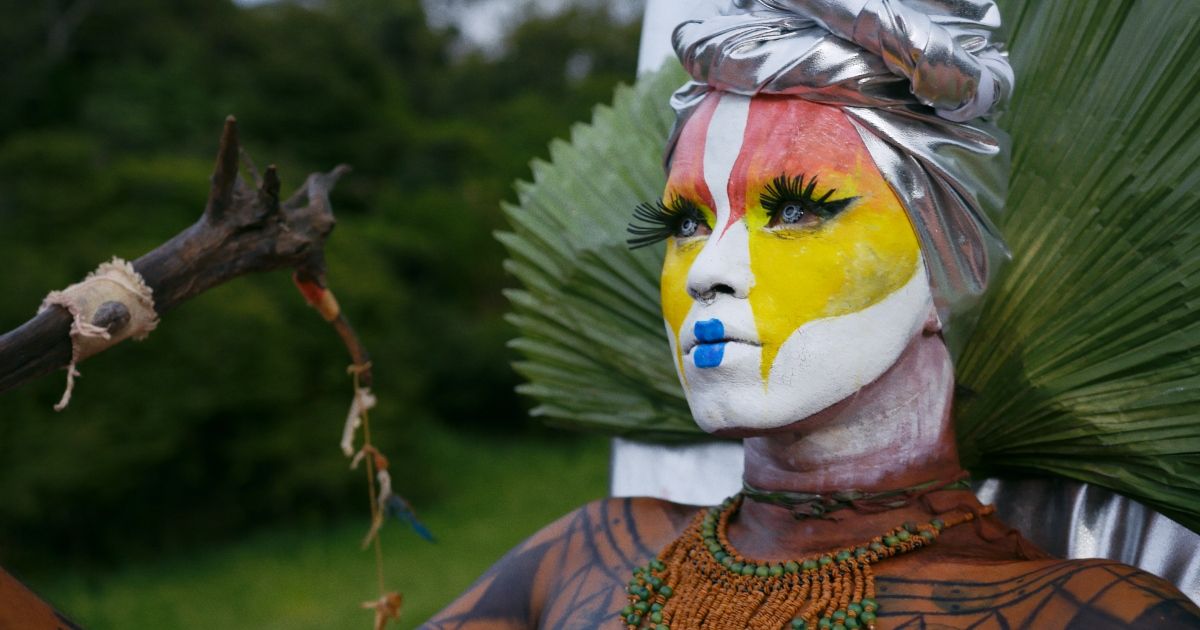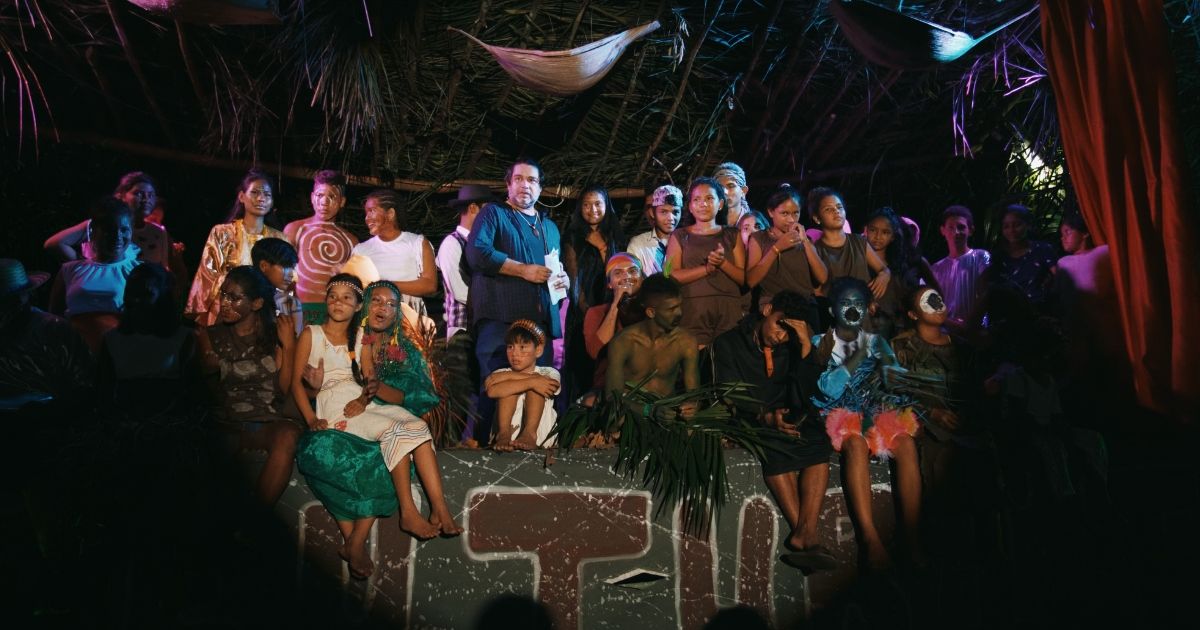What makes Brazilian-Latina director Juliana Curi stand out — in addition to a keen instinct for a story and an eye on how to frame it — is the democratic way in which she approaches the subject matter at hand. In her director's statement for her latest documentary UÝRA: The Rising Forest, Curi states her priority in making the film's production practices "as horizontal as possible." When asked to expand on her perspective, in our interview ahead of the movie's world premiere at Frameline Film Festival 2022, Curi says that she is "one piece of the puzzle of artists that come together from different fields of study to bring this story to life." She expresses the inherent impossibility of one person building a singular vision about a story, particularly one like UÝRA, which sits at the intersection of LGBTQ+ rights, Indigenous rights, and environmentalism.
UÝRA: The Rising Forest documents the eponymous Uýra Sodoma, a trans Indigenous artist who travels through the Amazon's riverside communities, using performance art as a means of teaching the Indigenous youth about structural racism and homophobia in Brazil. Through costume, art, and ancestral messages, Uýra's journey is also one of self-discovery. Indeed, Uýra is the alter-ego of Emerson, a non-binary Indigenous activist and biologist who, as they explain in a segment in Curi's documentary, didn't learn about their Indigenous origins until well into adulthood as a result of being "violently separated from their roots as a child." Uýra thus became a persona — "the tree that walks" — through which Emerson could reconnect to their ancestors.
"We met Uýra on Instagram," says Curi of how she and her screenwriting partner Martina Sönksen, after some research, first came across Emerson and their work. This was in 2019, and after a few meetings with each other, they were already on the same page, the connection practically instant. In fact, by the end of that same year — "We decide to make a small and private fund. We invited some co-producers; we didn't want to wait for all the grants and the developing process." — they had all packed their things and headed to the Amazon to shoot Uýra's story. "There was something super special about this because I felt a sense of urgency to tell the story, and Uýra felt the same."
UÝRA: The Rising Forest is an Important and Radical Documentary
Frameline Film Festival, formerly known as the Gay Film Festival of Super-8 Films, is a prime exhibition location for LGBTQ+ movies. As an important LGBTQ+ documentary, it makes sense that UÝRA: The Rising Forest would be making its world premiere here, especially when one considers that Brazil is currently one of the foremost countries that, according to Curi, "kills trans people, environmentalist activists, and Indigenous people." Though UÝRA is not necessarily a movie about politics, Brazil's far-right policies — which are largely responsible for the destruction of the country's rainforests and the Indigenous tribes that live there — were certainly on the minds of everyone involved in making UÝRA: The Rising Forest. "It's not an easy subject, but, at the same time, Uýra is creating a very powerful grassroots movement in the Amazon. So, being there with Uýra, we felt protected by her community. We know that it's a sensitive subject, but we [found] partners that [gave] us the structure to keep [going]."
Uýra was, in fact, instrumental in helping Curi unearth "the metaphor of the film, which is the ecological secession" of the Amazon. Prior to arriving on-location, Curi and Sönksen had drafted a skeleton of a script based on the work Uýra had at the time. "We had a few elements that [were] open to the experience that we would have [while] shooting there," says Curi. "Uýra started to bring this idea that we can make a parallel between what happened in the ecological secession and the social justice struggles." Through this collaborative effort — Uýra was also brought on as a producer — the team put together a list of six different performances that would segment the documentary. One, called "Gruta" (Cave), sees Uýra in a dark cave, half-animal and half-human, waking from hibernation and chanting, their sounds and movements representing the silenced voices. Another is called "Retomada" (Rising of the Forest), which was performed on the grounds of former Catholic Church that was built on top of an Indigenous cemetery, honoring their ancestors.
While there are many documentaries about climate change, what many fail to do — and what UÝRA: The Rising Forest shines a light on — is the disproportionate impact the climate crisis has on queer and racialized communities. In this way, UÝRA almost becomes a meditative journey through nature, with Emerson and the Indigenous youth finding and reclaiming their histories and identities through a physical connection to the Amazon. In various non-performance segments, we see Uýra constructing their costumes using natural materials around them, from the leaves to the weeds, amplifying the documentary's overall message that "plants crack structures of oppression."
The Importance of Giving Back
Part of Curi's efforts to implement, as mentioned before, a horizontal approach to the making of UÝRA: The Rising Forest includes its exhibition and accessibility in addition to its production. "We realized that, often, documentary films go [down] the traditional path of film festivals and theaters, and then streaming, and these films never return to the original community [they're about]," Curi says. "In order to avoid this kind of extractivist production, we designed a series of educational exhibitions in the Amazon, [so] we are democratizing the access to films in local communities in the Amazon, [guaranteeing] that [UÝRA] will return to the original communities. Every time we do a screening, we also offer an educational workshop. It's really beautiful."
Indeed, education is perhaps Curi's biggest take away from her journey in making UÝRA: The Rising Forest. Not only did the film help her connect with her own cultural identity – "I have a story that's similar to Uýra: my grandmother and great-grandmother were Indigenous, but I never found my [ancestry]." — but it also helped her understand the importance of knowledge. "I grew up with this feeling that Brazil is a place of epistemicide, which is the killing of knowledge," she says. "I think the most important thing in Uýra's message for me [is] that we are all connected by one cause, which is the preservation of life, and how the forest connects us all."
UÝRA: The Rising Forest had its in-person premiere at Frameline on June 22. Tickets for streaming access of the film during the rest of the festival's run (from June 24 to 30) and other information are available on Frameline's website.


